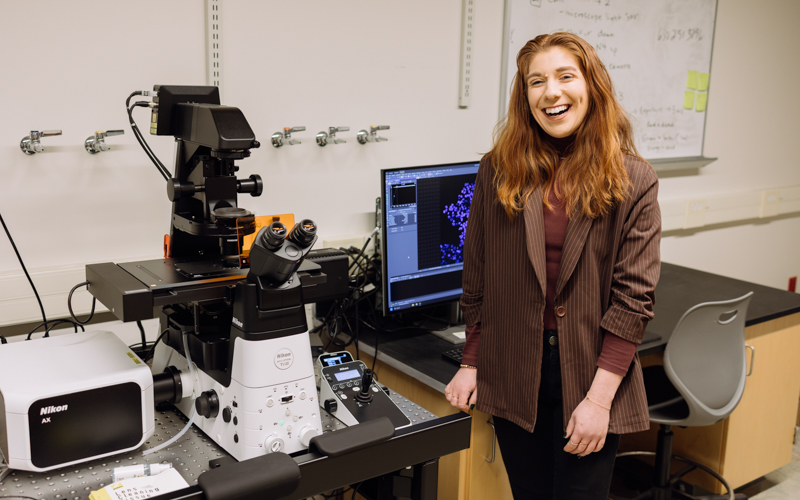January 23, 2025
 WHEATON, IL - Wheaton College unveiled its newly acquired confocal microscope on Tuesday, January 21. The cutting-edge research instrument, valued between $400,000 and $500,000, was made possible through a generous anonymous donation and will serve the academic departments of Biological and Health Sciences, Physics and Engineering, and Chemistry. It will be located in the newly established Wheaton Microscopy Core in the Meyer Science Center.
WHEATON, IL - Wheaton College unveiled its newly acquired confocal microscope on Tuesday, January 21. The cutting-edge research instrument, valued between $400,000 and $500,000, was made possible through a generous anonymous donation and will serve the academic departments of Biological and Health Sciences, Physics and Engineering, and Chemistry. It will be located in the newly established Wheaton Microscopy Core in the Meyer Science Center.
The Nikon AXR laser scanning confocal microscope significantly advances the College’s research capabilities. Unlike traditional widefield microscopy, which collects light from the full thickness of a sample, confocal microscopy can image one plane at a time, producing dramatically improved resolution by eliminating out-of-focus light. This technology, which includes unique 3D imaging capability, allows researchers to observe and study cellular phenomena that would otherwise remain invisible.
Confocal microscopes are typically found at large research universities due to their substantial cost. This acquisition positions Wheaton College among a select group of primarily undergraduate institutions with such advanced research equipment.
“Having access to a confocal microscope at a small Christian college like Wheaton is quite uncommon and a real blessing,” said Dr. Corbin Renken, Assistant Professor of Biological Health and Sciences.
The microscope presents an unprecedented opportunity for Wheaton’s science students to gain hands-on experience with advanced research equipment before entering graduate school. This experience will prove invaluable for those pursuing advanced degrees or careers in scientific research. The addition of this world-class instrument will also enhance the College’s ability to recruit and retain talented science faculty working at the forefront of their fields.
The dedication ceremony celebrated the transformative gift and its potential to advance scientific discovery while serving Wheaton’s mission of education for Christ and His Kingdom. Assistant Professor of Engineering Dr. Kelly Vazquez said, “As we look through the lens of this microscope, let us remember that we are not only observing the minute details of the natural world but also seeking to understand the beauty, complexity, and wisdom of the Creator’s design.”